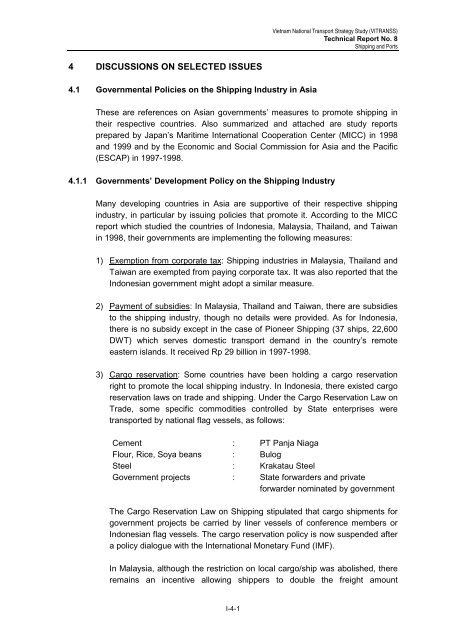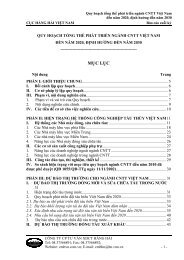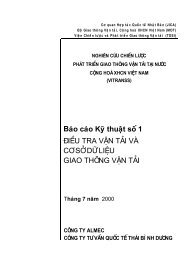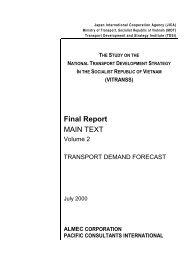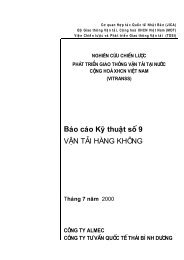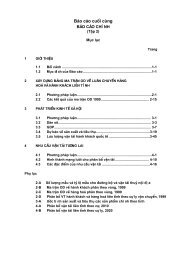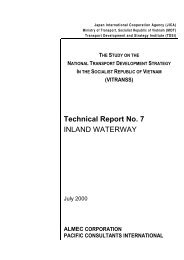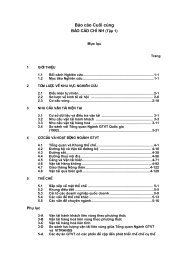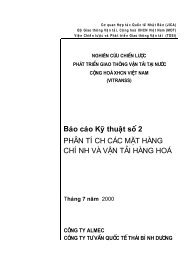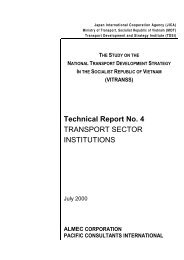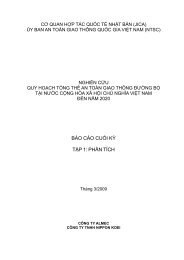Technical Report No. 8 PORT AND SHIPPING
Technical Report No. 8 PORT AND SHIPPING
Technical Report No. 8 PORT AND SHIPPING
Create successful ePaper yourself
Turn your PDF publications into a flip-book with our unique Google optimized e-Paper software.
4 DISCUSSIONS ON SELECTED ISSUES<br />
4.1 Governmental Policies on the Shipping Industry in Asia<br />
I-4-1<br />
Vietnam National Transport Strategy Study (VITRANSS)<br />
<strong>Technical</strong> <strong>Report</strong> <strong>No</strong>. 8<br />
Shipping and Ports<br />
These are references on Asian governments’ measures to promote shipping in<br />
their respective countries. Also summarized and attached are study reports<br />
prepared by Japan’s Maritime International Cooperation Center (MICC) in 1998<br />
and 1999 and by the Economic and Social Commission for Asia and the Pacific<br />
(ESCAP) in 1997-1998.<br />
4.1.1 Governments’ Development Policy on the Shipping Industry<br />
Many developing countries in Asia are supportive of their respective shipping<br />
industry, in particular by issuing policies that promote it. According to the MICC<br />
report which studied the countries of Indonesia, Malaysia, Thailand, and Taiwan<br />
in 1998, their governments are implementing the following measures:<br />
1) Exemption from corporate tax: Shipping industries in Malaysia, Thailand and<br />
Taiwan are exempted from paying corporate tax. It was also reported that the<br />
Indonesian government might adopt a similar measure.<br />
2) Payment of subsidies: In Malaysia, Thailand and Taiwan, there are subsidies<br />
to the shipping industry, though no details were provided. As for Indonesia,<br />
there is no subsidy except in the case of Pioneer Shipping (37 ships, 22,600<br />
DWT) which serves domestic transport demand in the country’s remote<br />
eastern islands. It received Rp 29 billion in 1997-1998.<br />
3) Cargo reservation: Some countries have been holding a cargo reservation<br />
right to promote the local shipping industry. In Indonesia, there existed cargo<br />
reservation laws on trade and shipping. Under the Cargo Reservation Law on<br />
Trade, some specific commodities controlled by State enterprises were<br />
transported by national flag vessels, as follows:<br />
Cement : PT Panja Niaga<br />
Flour, Rice, Soya beans : Bulog<br />
Steel : Krakatau Steel<br />
Government projects : State forwarders and private<br />
forwarder nominated by government<br />
The Cargo Reservation Law on Shipping stipulated that cargo shipments for<br />
government projects be carried by liner vessels of conference members or<br />
Indonesian flag vessels. The cargo reservation policy is now suspended after<br />
a policy dialogue with the International Monetary Fund (IMF).<br />
In Malaysia, although the restriction on local cargo/ship was abolished, there<br />
remains an incentive allowing shippers to double the freight amount


